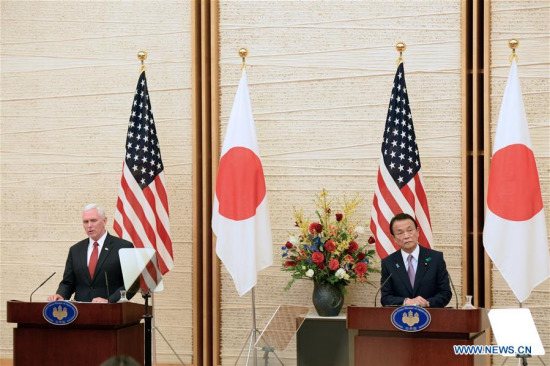
U.S. Vice President Mike Pence (L) and Japanese Deputy Prime Minister Taro Aso attend a press conference in Tokyo, Japan, on April 18, 2017. (Xinhua/Ma Ping)
Japan and the United States on Tuesday agreed to work together with countries in the region to address tensions on the Korean Peninsular and took steps towards bridging gaps in economic cooperation with the launch of the U.S.-Japan Economic Dialogue.
Japanese Prime Minister Shinzo Abe and visiting U.S. Vice President Mike Pence reaffirmed the Japan-U.S. alliance and the importance of cooperating with other countries in the region to peacefully realize a denuclearized Korean Peninsular.
At the outset of a working lunch with Abe, Pence said that the administration of U.S. President Donald Trump remained committed to working together with regional stakeholders to ensure a peaceful Korean Peninsular.
"President Trump is determined to work closely with Japan, with South Korea, with all our allies in the region, and with China, to achieve a peaceable solution and denuclearization of the Korean Peninsula," Pence said.
Prior to Pence's arrival from South Korea, Abe on Monday called for increased diplomacy rather than the use of force in dealing with the current situation regarding tensions on the Korean Peninsular.
Tensions have risen in the region of late, as the Democratic People's Republic of Korea (DPRK) has conducted multiple missile tests and two nuclear tests in the past 18 months, with the United States' recent deployment of an aircraft carrier unit to the region after holding large-scale "war games" near the peninsula also stoking concerns.
On Monday, Chinese Foreign Ministry spokesman Lu Kang said that China welcomes the United States to play a positive role in peacefully resolving the Korean Peninsula nuclear issue. He added that seeking a peaceful solution to the Korean Peninsula issue is a right direction and meets the interests of all related parties.
Dialogue and consultation is the only way to resolve the Korean Peninsula issue, said Lu, reaffirming China's stance.
During his visit, Vice President Pence also held talks with Japan's Deputy Prime Minister Taro Aso and launched the "U.S.-Japan Economic Dialogue" which will purportedly act as means to deepen bilateral economic cooperation through an ongoing forum.
The dialogue was agreed to in principle between Abe and Trump when the two leaders met in February and sets out three policy pillars that will structure the dialogue with further talks to be held in December.
But a number of thorny issues were shelved for the time being including the United States' hefty trade deficit with Japan in 2016, and Japan's highly-protectionist stance on imports, particularly regarding agriculture and automotive sectors.
The forum, according to a joint press release, spans trade and investment standards, cooperation on global economic development, infrastructure and energy and job creation.
The high-level talks were the first of their kind since the United States, under the Trump administration, backed out of the Trans-Pacific Partnership multilateral free trade agreement that would have seen Japan and the U.S. as the two largest economies involved.
Trump in January signed an executive order to officially withdraw the U.S. from the Trans-Pacific Partnership (TPP) trade deal.
"The TPP is a thing of the past for the United States. The Unites States is determined to reach out to our partners in the world to negotiate trade on a bilateral basis," Pence told a joint press briefing following talks with Aso.
Against a backdrop of trade deficits and currency concerns from the U.S., Aso said that talks held Tuesday were for the purpose of enhancing ties, rather than highlighting differences.
"Our discussions are aimed at boosting cooperation rather than resolving frictions," Aso said.


















































